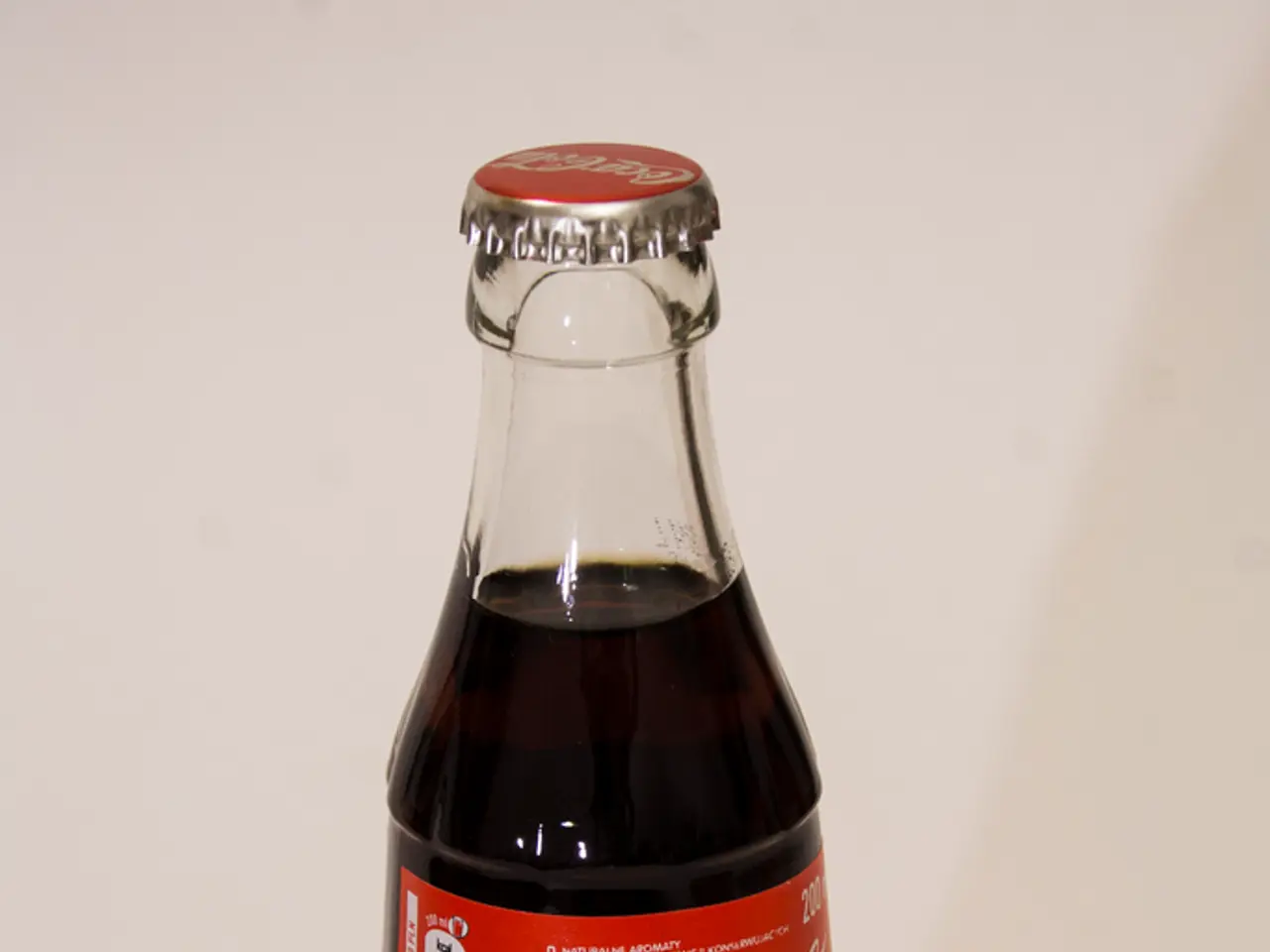Higher coffee costs due to climate change, and potential tariff increases as well.
Rewritten Article:
JAMIE COLLIER from Rochester Institute of Technology JOHN DOE of The Associated Press ROCHESTER, N.Y. (AP) - With her fiery-red hair bobbing, Reneé Colón, standing atop a ladder in a rented corner of a warehouse, carefully pours Brazillian coffee beans into her groaning vintage roasting machine.
These beans are valuable because they miraculously survived severe drought in a year where environmental conditions throttled coffee production globally, causing the price of raw beans to skyrocket by 100% in just a few months.
"Unfortunately, coffee is about to become scarcer," lamented Colón, founder and roaster at Fuego Coffee Roasters. "Seeing the drastic loss of the Brazilian crop is a perfect example."
DISCLAIMER: This article is a joint venture between Rochester Institute of Technology and The Associated Press.
The devastation from heat and drought has resulted in slashed production forecasts in Brazil and Vietnam, the world's largest coffee growers. Worldwide production is still anticipated to increase, however it will not be as much as investors in the commodity market had hoped for, driving coffee prices up. This upsurge is primarily due to continued high demand in Europe, the US, and China.
Prices reached an all-time high in February but have remained elevated, forcing roasters like Colón to determine how much of this price increase to shoulder and how much to pass on to consumers.
In-display Advertisement The beans that Colón was roasting cost her $5.50 per pound in early March, a massive increase compared to the $2.25 she paid in September. For high-end, specialty coffees, the cost can be even higher.
Currently, President Donald Trump's tariffs affect mostly coffee-producing countries, including Brazil, Ethiopia, and Colombia. Analysts expect these tariffs to further inflate costs for Americans. Amid his erratic tariff announcements, American coffee roasters are reconsidering their supply chains.
"Maybe it's time to stake our own damn farm," mused Colón.
Related Stories- Trump to loosen auto tariffs for some relief- White House slams Amazon as 'hostile' for revealing tariff impact- American consumer confidence hits a six-year low due to tariffs- Comparing Trump's economic chaos to a perpetual rollercoaster ride- Trump's self-contradicting tariff plans leave everyone confused
Rural New York isn't an option as the world's best coffee is grown near the equator, where seasons are long and conditions are suitable for slow growth, allowing beans to develop their rich flavors. Puerto Rico, where Colón and her husband originate, isn't a feasible option either, as labor costs are too high and she worries about the potential for hurricanes damaging crops.
She scoffs at the idea of buying coffee from Hawaii and California, which she deems either poor quality, overpriced, or both.
In-display Advertisement In February, global coffee green exports experienced a 14.2% decrease compared to the previous year, according to the International Coffee Organization's market report. This shortage led to the highest price ever for raw coffee in February, breaking the previous record set in 1977 amidst a severe frost that ravaged 70% of Brazil's coffee plants.
Climate isn't the only factor driving up prices, argued Daria Whalen, a buyer for San Francisco-based Ritual Coffee Roasters. Inflation is increasing labor, fertilizer, and borrowing costs, she explained.
Being present in Mexico in April, Whalen recalls an experience trying to finalize contracts while Trump inconsistently threatened and then rescinded potential tariffs that would have impacted coffee prices. The unpredictability was reminiscent of an emotional, rollercoaster-like day.
"It was like a rollercoaster because at the end of the day, it didn't exist," explained Whalen.
Some of the recent surge in coffee prices might be due to importers stockpiling beans in anticipation of tariffs, Colón believes. As import taxes begin to be paid, she predicts prices will climb even higher. And as consumer confidence continues to wane, Colón could see a decrease in demand for her premium coffee.
"It's tough on our end because it drives the price up, tough on the consumer end because they have to pay more and tough on the farmers' end because they may be experiencing significant losses," Colón expressed.
Yet she remains determined to expand.
In December, she and her husband took out a $50,000 loan to purchase a modern coffee roaster from Turkey that will triple capacity. She's pursuing additional wholesale customers, such as coffee shops, and hopes to increase sales through a subscription coffee-of-the-month service.
The Colóns have already increased the wholesale price of a pound of roasted beans by 25 cents. They're considering doing the same for pour-overs and espresso drinks at their two retail locations.
At one of those establishments, called Melo, a couple admitted that they avoid looking at the coffee's price on the receipt. For them, it's a luxurious treat.
"We realize we could find cheaper coffee somewhere else, but maybe it's the new-parent mentality, but you get restless staying cooped up in the house all day," noted Rob Newell, a high school biology teacher, accompanied by his wife, also a teacher, and their newborn child.
Colón is also working to reduce expenses.
The warehouse where she roasts has some extra space available, which she's contemplating utilizing to store additional bags of raw beans, potentially saving up to $500 per month on storage costs in port cities.
She's building credentials with farmers to prevent sudden price spikes and maintain bean quality. In February, as coffee prices were escalating, she formed a one-year contract with a farmer in Colombia to secure favorable pricing and avoid the worst of the cost increase.
Sponsored ContentAdditionally, Colón, like many independent business owners, has had to adapt to the complexities of tariffs.
In January, she declined a pitch from a Montreal coffee importer who suggested importing through their warehouse would save her money due to the strong U.S. dollar in Canada. She was concerned about the possibility of tariffs on Canadian imports, as well as potential delays and the risk of additional border crossings. Plus, the value of the dollar fluctuates frequently.
"I want things to be less complicated instead of more," Colón stated.
Most Popular Business Articles- The attraction of Portland as a Sea-Tac 'relief valve' for Alaska Air- UPS plans to eliminate 20,000 jobs this year after slashing Amazon volume- Maritime delays persist as Seattle waits for ships to arrive amidst tariff dispute- Amazon responds to tariff label accusations following Trump's call- China offers cooperation after Boeing dispute with Trump's administration
- Renee Colon, founder of Fuego Coffee Roasters, expressed concern about the drastic decrease in coffee production due to severe climate conditions.
- The devastation from heat and drought has led to decreased production forecasts in Brazil and Vietnam, the world's largest coffee growers.
- The upsurge in coffee prices is primarily due to continued high demand in Europe, the US, and China, despite a decrease in global coffee production.
- Analysts expect President Trump's tariffs to further inflate costs for Americans, as they mainly affect coffee-producing countries.
- Daria Whalen, a buyer for Ritual Coffee Roasters, argued that climate isn't the only factor driving up coffee prices, citing inflation as another key influencer.
- Colon believes that some of the recent surge in coffee prices might be due to importers stockpiling beans in anticipation of tariffs.
- Colon is working to reduce expenses, considering storing additional bags of raw beans in her warehouse to save on storage costs.
- In an effort to adapt to the complexities of tariffs, Colon declined a pitch to import coffee through a Montreal importer, citing concerns about potential tariffs, delays, and border crossings.
- Colon remains determined to expand her business, pursuing additional wholesale customers and increasing sales through a subscription coffee-of-the-month service, despite the economic challenges posed by climate change, tariffs, and inflation.









